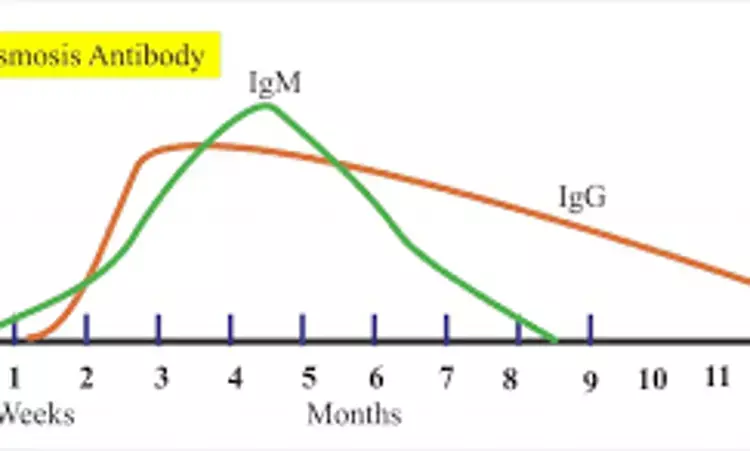- Home
- Medical news & Guidelines
- Anesthesiology
- Cardiology and CTVS
- Critical Care
- Dentistry
- Dermatology
- Diabetes and Endocrinology
- ENT
- Gastroenterology
- Medicine
- Nephrology
- Neurology
- Obstretics-Gynaecology
- Oncology
- Ophthalmology
- Orthopaedics
- Pediatrics-Neonatology
- Psychiatry
- Pulmonology
- Radiology
- Surgery
- Urology
- Laboratory Medicine
- Diet
- Nursing
- Paramedical
- Physiotherapy
- Health news
- Fact Check
- Bone Health Fact Check
- Brain Health Fact Check
- Cancer Related Fact Check
- Child Care Fact Check
- Dental and oral health fact check
- Diabetes and metabolic health fact check
- Diet and Nutrition Fact Check
- Eye and ENT Care Fact Check
- Fitness fact check
- Gut health fact check
- Heart health fact check
- Kidney health fact check
- Medical education fact check
- Men's health fact check
- Respiratory fact check
- Skin and hair care fact check
- Vaccine and Immunization fact check
- Women's health fact check
- AYUSH
- State News
- Andaman and Nicobar Islands
- Andhra Pradesh
- Arunachal Pradesh
- Assam
- Bihar
- Chandigarh
- Chattisgarh
- Dadra and Nagar Haveli
- Daman and Diu
- Delhi
- Goa
- Gujarat
- Haryana
- Himachal Pradesh
- Jammu & Kashmir
- Jharkhand
- Karnataka
- Kerala
- Ladakh
- Lakshadweep
- Madhya Pradesh
- Maharashtra
- Manipur
- Meghalaya
- Mizoram
- Nagaland
- Odisha
- Puducherry
- Punjab
- Rajasthan
- Sikkim
- Tamil Nadu
- Telangana
- Tripura
- Uttar Pradesh
- Uttrakhand
- West Bengal
- Medical Education
- Industry
All neonates exposed to toxoplasma in-utero may not necessarily be infected :study

Toxoplasma is one of the prevalent infectious disease and its infection in pregnancy can cause chorioretinitis and delayed psychomotor development in infants.
Guidelines on management of infants exposed to toxoplasmosis in utero recommend screening paired blood samples from mother and baby and the target organs for disease at birth. Infants are considered not infected if Toxoplasma gondii immunoglobulin IgM titers are negative and IgG titers are equal or lower than their mothers, with no evidence of congenital toxoplasmosis after complete clinical, radiologic, and laboratory evaluation.
Brazil which is the most prevalent for Toxoplamsis, researchers conducted a reteropsective study at a tertiary care centre in Brazil to evaluate inutero toxoplasma exposed infants.
Researchers included all infants up to 12 months of age with history of in utero exposure to T. gondii between 2008 to 2017 and excluded those who were not followed up and who were diagnosed positive for congenital toxoplasmosis.
Infants were considered exposed to toxoplasma maternal acute infection during pregnancy defined by presence of serum IgM or reactive IgG for T. gondii in a woman with previously non-reactive IgG level. In these exposed infants monthly measurement of T. gondii IgG is recommended to exclude congenital infection and levels of T.gondii IgG titers are expected to reduce by half every month until undetectable.
Key findings of the study are:
-Out of 341 reviewed cases, 240 cases were found exposed to in-utero Toxoplasma infection.
-The mean gestational age at the time of maternal diagnosis of T. gondii infection was 19.2 weeks (35.5% in the first and 42.7% in the second trimester of pregnancy). A total of 76.3% mothers were started on treatment with spiramycin or sulphadiazine and pyrimethamine.
-The mean (range) time for toxoplasmosis IgG titers to become undetectable in the serum was 7.9 (0.8 to 25.0)
months.
-Majority of infants were seronegative before 12 months except for 14 infants who took more than 12 months to become negative serology.
Authors conclude: "infants with exposure may continue to be followed and be considered as only exposed in utero to toxoplasmosis but not infected when the serology is negative after 12 months of life."
Source:Indian Pediatrics Journal
Dr Kamal Kant Kohli-MBBS, DTCD- a chest specialist with more than 30 years of practice and a flair for writing clinical articles, Dr Kamal Kant Kohli joined Medical Dialogues as a Chief Editor of Medical News. Besides writing articles, as an editor, he proofreads and verifies all the medical content published on Medical Dialogues including those coming from journals, studies,medical conferences,guidelines etc. Email: drkohli@medicaldialogues.in. Contact no. 011-43720751


